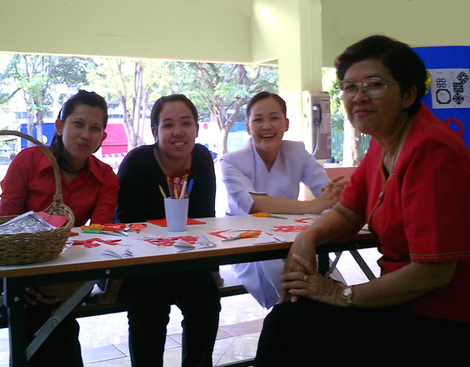
When you teach English (EFL) in Thailand, most schools will assign a Thai co-teacher to you. The Thai co-teacher will be your co-homeroom teacher, if you have a homeroom, will often be in the classroom when you teach to help with the kids and, in some schools, will even help with paperwork. Thai co-teachers are helpful, they know the ropes, if they like you they’ll often run interference with the school admin for you and, oh yes, some are great at translating too.
These and many other reasons are why every foreign teacher in Thailand should attempt to bond with their Thai co-teacher. Plus, if you don’t, some of them can make your life a misery.
If you teach or are going to teach in a Thai school, follow these tips to bond with your Thai co-teacher. You’ll be happy you did.
Don’t Treat Your Thai Co-Teacher Like An Assistant – Too many westerners treat their Thai co-teacher like an assistant or a glorified slave.
They pass tasks onto them they should be doing themselves, make the co-teacher do paperwork that’s their own responsibility, ignore them in the staff room, and generally do everything they can to treat them like second-class citizens.
Thai co-teachers are fully qualified teachers. In fact, most of them are more qualified than many of the western ‘teachers’ who come to Thailand. Treat your Thai co-teacher like the fully qualified teacher they are and like the ‘partner’ they are and your relationship with them will benefit.
Ask For Your Thai Co-Teachers Advice – Thai culture and society is far different than any western society, which means problems can develop in classrooms that may not develop in the west.
That’s why it’s a good idea to ask your Thai co-teacher for their input if you’re having problems with the kids or the Thai administration. Solutions you haven’t thought of and that are more appropriate to Thai culture are likely second-nature to your Thai co-teacher.
Ask them for their advice, it’ll probably help you and your co-teacher will feel valued and respected.
Learn About Your Thai Co-Teacher’s Background and Family – Thais are extremely close to their families and proud of them. If you go out of your way to learn about your co-teacher’s background, where they come from, how many brothers and sisters they have, about their parents etc., you’ll immediately become a valued friend.
Doing this makes your Thai co-teacher realize you’re treating them like a person and not looking down on them and their family (as some western teachers do).
Don’t Ignore Your Co-Teacher in the Staff Room – I’ve sat in staff rooms in Thailand where the foreign staff sit at one side of the room and the Thai staff at the other.
Neither side really talks to the other (the foreigners because they usually don’t speak much Thai and the Thai staff because they’re shy, and don’t speak much English).
Don’t ignore your co-teacher in the staff room. You can still share a joke even if your Thai is minimal. Besides, if it requires more complicated communication, there’s always someone who can help translate for you.
Don’t Talk Down To Your Co-Teacher in Front of the Kids – I’ve seen some western teachers who have talked down to or berated their Thai co-teachers in front of their students.
Teachers are some of the most respected people in Thailand and to talk down to or embarrass yours in front of their students is completely unacceptable. It will also make sure 100% that, from now on, your co-teacher will make your life at school very difficult.
Plus, your students won’t like you much either.
Eat Lunch With the Thai Teachers – In many Thai schools, the foreign teachers eat lunch at one table and the Thai teachers at the other. A couple of days a week, sit at a table with the Thai teachers.
Most Thais have a great sense of humor and are fun to talk to. Plus, eating lunch with them will go a long way to creating a bond with your Thai co-teacher and other Thai teachers at the school.
Be Generous – Thais are generous people and love to share, particularly when it comes to food. Bring in snacks, cookies and cake now and again for your co-teacher plus the rest of the staff in the staffroom. The Thais will love it and it will go a long way to creating a bond with every teacher in the room.
Most of all, treat your Thai co-teacher the same way you would like to be treated, and the same way you probably treat your western co-workers.
Treat them as an equal, treat them as a valued co-worker, get to know them, eat with them occasionally and, in general, go out of your way to be kind, respectful and professional.
It will benefit you in so many ways, not only in your school life, but outside school too (Thais love to help foreigners with any problems they have out of work too). After all, you’re both at the school to help the kids, and working together to do so will make that job a heck of a lot easier.
